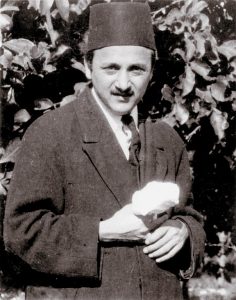
[Wikimedia (public domain)]
A couple of years ago, I attended a Ridván service at our local Bahá’í community. The service lasted only about 40 minutes, and most of that time was spent listening to passages from the writings of Bahá’u’lláh and enjoying Bahá’í songs/hymns. When the service ended, there were a few announcements about upcoming community events, and then we talked amongst ourselves while the service leaders set out some refreshments.
And that’s when the coolest thing happened. One of the men in attendance, an olive-skinned Iranian with a wrinkled face, sat in the chair next to my friend and me. “I want to tell you an interesting story,” he said. What follows is my best recollection of his wonderful tale.
(I have since been told by a Bahá’í friend that the location of this story is probably incorrect. Shoghi Offendi was 4 or 5 in this story, so the events would have happened in about 1902. ‘Abdu’l-Bahá would have been living in Akka, Palestine at that time…not Iraq.)
I am 4th generation Bahá’í . In the early 1900s, my grandmother decided she wanted to meet ‘Abdu’l-Bahá. He was the oldest son of Bahá’u’lláh, the man who founded the Bahá’í faith. ‘Abdu’l-Bahá was living in Iraq near Baghdad. My grandmother was in Iran. Do you know how long it took to travel from one place to the other back then? Three months. On horses. My grandmother packed all sorts of things for this very long journey – food, supplies, clothes, etc. Before she left, one of my grandmother’s friends said to her, “I am old – older than you – and could never make this long journey. But, I want to give you something to offer ‘Abdu’l-Bahá.” She gave my grandmother some cookies. These cookies are delicious – made with walnuts and sugar and shaped into a ball. They are called koloocheh. My grandmother had misgivings about packing cookies for such a long journey, but she placed them in one of the saddlebags at the back of the caravan anyway. “Really,” she wondered to herself, “how good will those cookies taste after weeks and weeks of travel in the hot sun?” But it was a favor for a friend.
My grandmother eventually met ‘Abdu’l-Bahá. When she arrived, she was seated in a chair in a beautifully decorated room. All of sudden, a little boy, about 4 or 5 years of age, came running in. His name was Shoghi Effendi. “Where are the cookies?” he asked. “What are you talking about, my boy?” I have nothing with me. I have come to see your father. “But you do have cookies. I know it. They are with the horses.”
My grandmother suddenly remembered the koloocheh, but there’s no way the child could have been talking about those cookies. How could he have known? She had just arrived, and no one had mentioned cookies.
But of course, Shoghi Effendi knew. My grandmother retrieved the cookies, and he enjoyed them, saying they were the best cookies he had ever tasted. Many years later, of course, he became head of the faith following his father’s death. I love Shoghi Effendi, and I love this story. He was special – even as a little boy. And my grandmother, who traveled all that way, was able to experience it.
I looked into his very dark brown, very knowing eyes – full of nostalgia and joy – as he shared this deep personal connection with his faith. How different the world would be, I thought to myself, if each of us could have what he has.